Mama
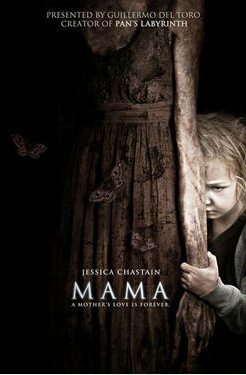
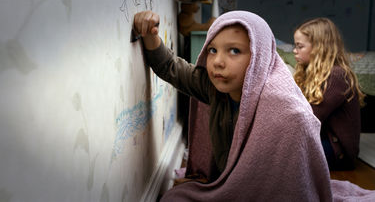 Mama grabs our attention right from the start with a great prologue, concerning a father and businessman (Nikolaj Coster-Waldau) having a mental breakdown in the brink of a financial meltdown. He's murdered two of his co-workers, and as the film opens, has just arrived home to murder his estranged wife. With the job done, he grabs his two young daughters, Victoria (age 3) and Lilly (age 1), and drives off with them. He doesn't seem to have a plan as to where he's running off to with the girls, and in his haste, the car slides off the icy roads, landing in the middle of the woods below. Everyone manages to survive, and make their way to a seemingly-abandoned cabin in the middle of the woods. As is frequently the case with cabins in horror movies, it is inhabited by an evil and shadowy entity who immediately kills the father, but takes pity on the two young girls.
Mama grabs our attention right from the start with a great prologue, concerning a father and businessman (Nikolaj Coster-Waldau) having a mental breakdown in the brink of a financial meltdown. He's murdered two of his co-workers, and as the film opens, has just arrived home to murder his estranged wife. With the job done, he grabs his two young daughters, Victoria (age 3) and Lilly (age 1), and drives off with them. He doesn't seem to have a plan as to where he's running off to with the girls, and in his haste, the car slides off the icy roads, landing in the middle of the woods below. Everyone manages to survive, and make their way to a seemingly-abandoned cabin in the middle of the woods. As is frequently the case with cabins in horror movies, it is inhabited by an evil and shadowy entity who immediately kills the father, but takes pity on the two young girls.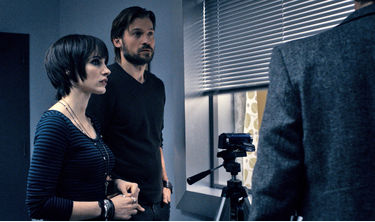 Flash forward five years later, and we're introduced to Lucas, the brother of the ill-fated man in the opening scenes, who is also played by Coster-Waldau in a dual role. He's a struggling artist, living with his punk rocker girlfriend, Annabel (Jessica Chastain) in a small apartment. For the past five years, he's organized searching parties for the two missing girls, and for information on what happened to his brother after the violent rampage. Word finally comes that the two girls have been found. They're still in the cabin where we left them, only now, they have grown feral, having lived mostly on their own in the wilderness all this time. Young Victoria is now played by Megan Charpentier, while her little sister Lilly is played by Isabelle Nelisse. Both give extremely effective performances, as they manage to be sympathetic, as well as somewhat alien and terrifying, given their very unnatural and inhuman way of moving and acting when they are in their "feral" states during the first half of the film. The children are placed in a psych hospital under the care of the shady Dr. Dreyfus (Daniel Kash), who seems particularly fascinated in the story the girls tell of "mama", a shadowy figure who lived in the walls of the cabin, and took care of them during the years they were alone.
Flash forward five years later, and we're introduced to Lucas, the brother of the ill-fated man in the opening scenes, who is also played by Coster-Waldau in a dual role. He's a struggling artist, living with his punk rocker girlfriend, Annabel (Jessica Chastain) in a small apartment. For the past five years, he's organized searching parties for the two missing girls, and for information on what happened to his brother after the violent rampage. Word finally comes that the two girls have been found. They're still in the cabin where we left them, only now, they have grown feral, having lived mostly on their own in the wilderness all this time. Young Victoria is now played by Megan Charpentier, while her little sister Lilly is played by Isabelle Nelisse. Both give extremely effective performances, as they manage to be sympathetic, as well as somewhat alien and terrifying, given their very unnatural and inhuman way of moving and acting when they are in their "feral" states during the first half of the film. The children are placed in a psych hospital under the care of the shady Dr. Dreyfus (Daniel Kash), who seems particularly fascinated in the story the girls tell of "mama", a shadowy figure who lived in the walls of the cabin, and took care of them during the years they were alone.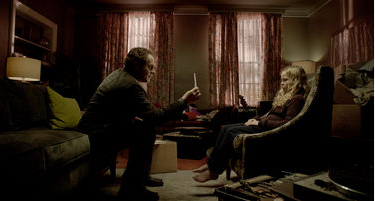 Eventually, Victoria and Lily are well enough to leave the care of the hospital, and are sent to live with Lucas and Annabel. For Annabel, this is not the ideal situation, as she is not interested in being a mother in the first place. She wants to make music, and is only doing this, because it's important to Lucas. Shortly after the girls move into the new home that Lucas has provided for them, ominous things begin to happen. They are somewhat innocent at first, which is one of the strengths of the screenplay, in how it can creep us out in subtle ways. In one particularly memorable scene, we see little Lilly playing with someone (who remains off camera) in her bedroom, which should be impossible, since we see everyone else in the house outside the bedroom, going about their daily lives, oblivious to what's going on just around the corner. It's a scene that brings to mind the playfulness of Spielberg when he built suspense in films like Close Encounters or Poltergeist. Of course, we know that "mama" has followed the girls to their new home, and is not happy that they now have new parents looking after them.
Eventually, Victoria and Lily are well enough to leave the care of the hospital, and are sent to live with Lucas and Annabel. For Annabel, this is not the ideal situation, as she is not interested in being a mother in the first place. She wants to make music, and is only doing this, because it's important to Lucas. Shortly after the girls move into the new home that Lucas has provided for them, ominous things begin to happen. They are somewhat innocent at first, which is one of the strengths of the screenplay, in how it can creep us out in subtle ways. In one particularly memorable scene, we see little Lilly playing with someone (who remains off camera) in her bedroom, which should be impossible, since we see everyone else in the house outside the bedroom, going about their daily lives, oblivious to what's going on just around the corner. It's a scene that brings to mind the playfulness of Spielberg when he built suspense in films like Close Encounters or Poltergeist. Of course, we know that "mama" has followed the girls to their new home, and is not happy that they now have new parents looking after them.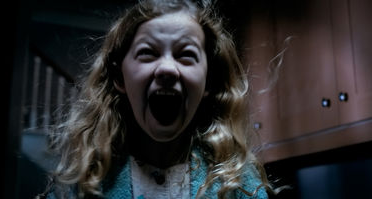 Mama (which started life as a three minute short film) is a horror movie that's just as interested in having us grow attached to its characters, as much as it is in scaring us. The fact that it is successful on both fronts is no small feat. The movie takes its time, letting us get to know these characters and their situations, while all the while, we know that something is wrong. It's a skillful blend of human drama (Annabel learning to accept her position as guardian of these two girls, while the children are trying to re-adapt to society) and a first-rate supernatural thriller that, yes, does borrow a lot of ideas from other films (there seem to be a lot of nods to Japanese horror), but does so in an effective way. It doesn't reinvent the haunted house movie, but it doesn't have to, since it proves that the old standbys can still work if they are done masterfully, as is the case here.
Mama (which started life as a three minute short film) is a horror movie that's just as interested in having us grow attached to its characters, as much as it is in scaring us. The fact that it is successful on both fronts is no small feat. The movie takes its time, letting us get to know these characters and their situations, while all the while, we know that something is wrong. It's a skillful blend of human drama (Annabel learning to accept her position as guardian of these two girls, while the children are trying to re-adapt to society) and a first-rate supernatural thriller that, yes, does borrow a lot of ideas from other films (there seem to be a lot of nods to Japanese horror), but does so in an effective way. It doesn't reinvent the haunted house movie, but it doesn't have to, since it proves that the old standbys can still work if they are done masterfully, as is the case here. 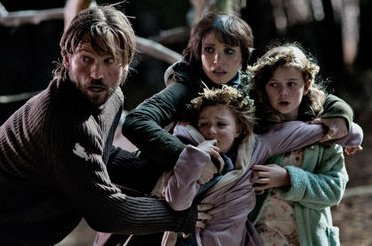 For most of its running time, "mama" chooses to stay mostly in the background, emerging briefly as a swirling black, shadowy mass, or a substance growing on the walls. During the third act, she reveals herself through CG and a performance by Spanish actor Javier Botet. Quite frankly, she's scarier when she stays in the shadows. In fact, the last 15 minutes fall apart, because we see too much of her. Up until then, this had been a subtle, intelligent, and creepy thriller. Then, it all explodes in a rushed climax of special effects and half-baked plot developments. Before all that does happen, however, I loved every minute of this film. And even the ending, flawed as it is, isn't enough to drag down what works. The performances, the atmosphere, and the unusual amount of intelligence rarely seen in a Hollywood horror film all outweighs any negatives. Director and co-writer Andy Muschietti, his team of writers, and producer Guillermo del Toro have set out to create an effective and smart little ghost story, and have strongly succeeded.
For most of its running time, "mama" chooses to stay mostly in the background, emerging briefly as a swirling black, shadowy mass, or a substance growing on the walls. During the third act, she reveals herself through CG and a performance by Spanish actor Javier Botet. Quite frankly, she's scarier when she stays in the shadows. In fact, the last 15 minutes fall apart, because we see too much of her. Up until then, this had been a subtle, intelligent, and creepy thriller. Then, it all explodes in a rushed climax of special effects and half-baked plot developments. Before all that does happen, however, I loved every minute of this film. And even the ending, flawed as it is, isn't enough to drag down what works. The performances, the atmosphere, and the unusual amount of intelligence rarely seen in a Hollywood horror film all outweighs any negatives. Director and co-writer Andy Muschietti, his team of writers, and producer Guillermo del Toro have set out to create an effective and smart little ghost story, and have strongly succeeded.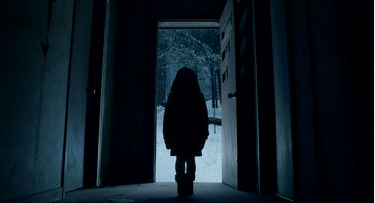
See the movie times in your area or buy the DVD at Amazon.com!






0 Comments:
Post a Comment
<< Home